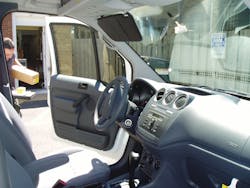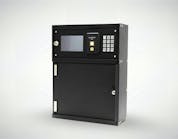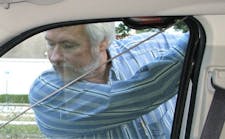If we took a poll of what service vehicles were favored by locksmiths, probably one of the most popular vehicles would be the Chevrolet Astro or GMC Safari vans. They were big enough to carry equipment and supplies but small enough to wiggle through city traffic. A close second choice might the larger Chevrolet Express/GMC Savana, Ford E-series or Dodge Ram vans. With the advent of high gas prices, these large vans became too costly to operate for our business budget.
Dodge dropped their Ram Van in 2003 and the only medium-sized Ford van, the Aerostar, was dropped in 1997. This left the GM Astro and Safari vans as the logical choice for a rather fuel efficient, capable service vehicle. Then GM dropped both of these models in 2005. Why GM dropped the Astro/Safari vans is a mystery.
When we needed a new work van in 2009, our local Chevrolet dealer could only offer us the alternatives of an HHR (no work space) or a Chevrolet pickup, with less pickup bed, with a fiberglass aftermarket walk-in unit. The final result looked like a big lemon sitting on a little Colorado pickup. We decided to have $2000 worth of work done to our trusty 2003 Astro Van and keep it going.
Finally this summer the old 2003 needed more costly repairs and it was time to check the service van field one more time. Our two choices were the Nissan NV series van and the Ford Transit Connect van. We first looked at the new Nissan NV van. Our vans are travel in a suburban area and most of the work is done within a 30-mile diameter. There is plenty of room in the Nissan van, and it is even available in two different heights depending on your headroom needs.
Next we visited a Ford dealer to look at the Transit Connect. After careful consideration, we did decide on the Ford. The choice was made completely on size. Because of its size, the Ford Transit Connect has good gas mileage and will easily traverse the narrow streets in our urban driving area.
The Nissan dealer advised us that Nissan will be introducing a smaller truck model sometime next year. We have other Astro Vans which will need replacement in the near future, so we will definitely be back later to look at the new smaller Nissans.
Transit Connect vehicles are in short supply in the Chicago area. The vans are made in Turkey and we had to wait approximately eight weeks for a shipment. The Ford salesman called several times to tell us that our van was "still on the water."
When placing our Transit Connect order, we also requested shelving to be pre-installed. Steel shelving by Adrian Steel was already in the van when we took delivery.
The Transit Connect has sliding doors on both sides of the vehicle. This is helpful if the van is used as a passenger van, but less helpful when the van is used as a service van because the cabinets are shortened so they do not obstruct either door opening.
It is obvious that the working area in a Ford Transit Connect is smaller than in our old Astro van. This will take some careful planning on how much stock to carry but with the cost of fuel not expected to ever go down again, we must learn to accept conditions as they are.
Modifications to the work area consist of the addition of a 110 volt inverter for operating key machines. The inverter was removed from our old service vehicle, so cables and battery fittings were reused. The invertor was installed behind the front driver seat for easy electrical access.
Another modification involved the construction of a table top work area. Adrian Steel cabinets extend to the ceiling so there was no place to have a table work area. The solution was to make a hinged table which fits across the driver’s side sliding door area. The work bench can be folded out of the way if necessary, but generally it stays in place. Entering and exiting the work area is done from the curb side of the vehicle.
The final modification is signage. Each of our trucks is a moving billboard for the public to see as our locksmiths travel around the area. Computers have taken over the sign painter’s job. The words we want printed on the new truck were sent by E-mail to the sign maker. The signage was not ready for this article, but the sign company sent back images of what the signs will look like for our approval. The picture in this article is not the actual finished vehicle signs, but only the computer image of what the vehicle will look like.
The Ford Transit Connect is smaller than our old Astro Van and that does take some personal adjustment. Many of the Transit Connect vans on the road have a roof rack to carry ladders and we may need a roof rack too. The roof is a little lower inside as compared to Astro Vans and that is a problem for taller workers, but the driver’s seating position is very comfortable regardless of the driver’s height. The van does get approximately 20-25 miles per gallon and that is an important plus these days.
Finishing touches are never complete. Extras such as interior lights are yet to be installed. So far, however, our shop is very pleased with our new addition.






